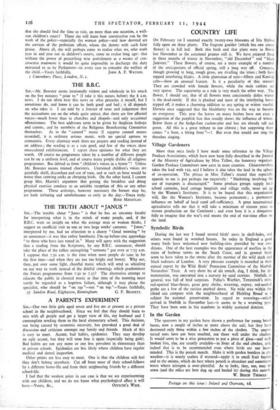• COUNTRY LIFE
ON February 1st I counted exactly twenty-two blossoms of Iris Stylo4 fully open on three plants. The fragrant guelder (which has one centre flower) is in full leaf. Both this bush and that plant were in flower last November as the autumnal prunus still is. We haversnjeyed these in three months of winter in November, "old December" and "black Janiveer." These flowers, of course, are a mere example of a number of the anticipations of official spring, still a long way off. Crocuses, though growing in long, rough grass, are rivalling the irises ; both have topped interfering blades. A little plantation of nuts—filbert and Kentish cobs—show an unusual feature. Is it a peculiarity of this season? They are crowded with female flowers, while the male catkins are very sparse. The superiority as a rule is very much the other way. The flower, I should say, that of all flowers most consistently defies winter is the dead-nettle. If this is plucked and most of the interfering leaves nipped off, it makes a charming addition to any spring or winter vasefuL Darwin once suggested that the blackberry was on the way to become
an evergreen. This year the leaves on many bushes have not even a suggestion of the purplish hue that usually shows the influence of winter.
Below them at the hedge-foot cuckoo-pint and kex are already tall and green. All this is a great tribute to our climate ; but supposing there comes "a frost, a biting frost "-1 But even that would not stop the thrushes singing.
Village Gardeners More than once lately I have made some reference to the Village Produce Associations, which have now been fully described in the Journal of the Ministry of Agriculture by Miss Talbot, the honorary organiser. Garden Produce Committees now exist in most counties. Gloucestershire takes the lead with 122, and I believe it also takes the lead in the sphere of co-operation. The phrase in Miss Talbot's record that especially appeals to me is put perhaps too negatively : "Marketing involving the use of transport is discouraged." Some produce groups supply local school canteens, local cottage hospitals and village stalls, most set up by the Women's Institutes. It is to be hoped that this organisation will, like the Women's Institutes, become permanent ; a permanent influence on behalf of local rural self-sufficiency. A great international agriculturist tells me that it will take a minimum of sixteen years to restore production on the Continent ; and even here it is a dangerous folly to imagine that the war's end means the end of war-time effort on the land.
Symbolic Birds During the last war I found several birds' nests in shell-holes, and others were found in wrecked houses. So today in England a good many birds have welcomed new building-sites provided by war con- ditions. One of the best examples was the appearance of merlins in the ruins of harbour towns on the South Coast, and in general birds seem to have taken to the towns after the manner of the wild duck and black redstarts of London. A very pleasant example is recorded in their annual report by the Wild Birds' Protection Committee of the Norfolk Naturalists' Trust. A very short bit of slit trench, dug, I think, for de- monstration, was converted into a nursery by sand martins. Norfolk, in general, was full of bird surprises. Pallas's Warbler, Temmincit's stint, red-spotted blue-throat, great grey shrike, waxwing, osprey, red-necked grebe are a few of the rarities marked down. No wide area within the island can compare with the neighbourhood of Hickling Broad as a subject for national preservation. In regard to waxwings—which arrived in Norfolk in November last—it seems to be a waxwing year. They have been seen in fair numbers in widely scattered districts.
In the Garden The sparrows in my garden have shown a preference for young broad beans, now a couple of inches or more above the soil; but they hare destroyed only those within a few inches of the cloches. The unpro- tected ones have not been touched, nor those well under the clothes. It would seem to be a wise precaution to put a piece of glass—and such broken' bits, alas, are usually available—in front of the end cloches' and, indeed that is to be recommended even where birds are not bean- minded. This is the potash month. Make it with garden bonfires in dry weather—it is nearly useless if watered—apply it to small fruit bushes and to the onions, which do best where potash is abundant and sometimes worst where nitrogen is over-plentiful. As to leeks, they, too, may be sown (and the relics are best dug up and heeled in) during this mantis.
W. BEACH TnostAs.
Postage on this issue : Inland and Overseas, Ia.


























 Previous page
Previous page